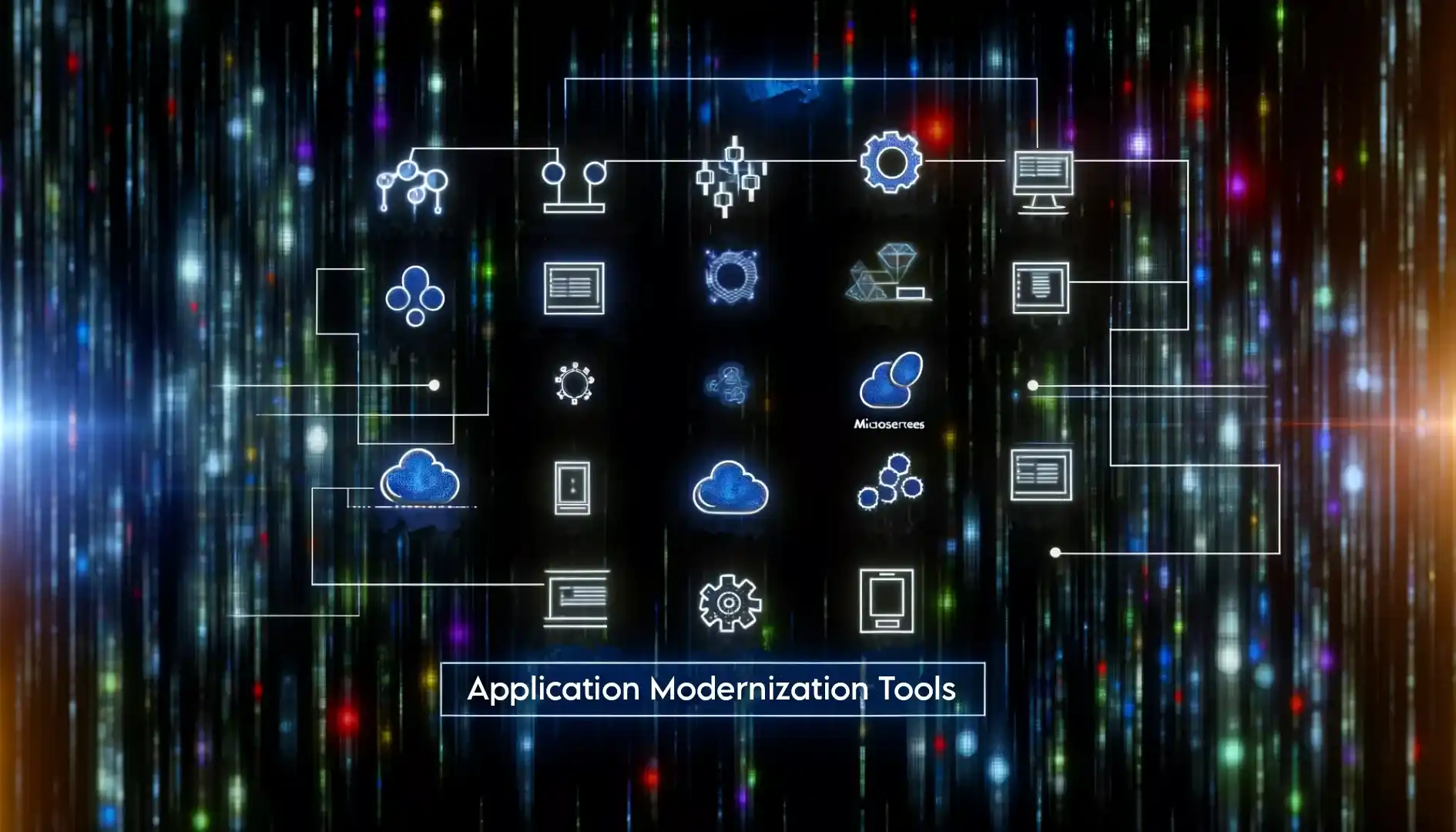Table of Contents
In today’s rapidly evolving technological landscape, businesses are continually challenged to maintain competitiveness while navigating the complexities of the digital age. As a response, application modernization tools have become paramount for organizations striving to optimize efficiency, scale operations, and bolster agility within their software ecosystems. Through the strategic adoption of cutting-edge application modernization tools, companies can catalyze progress and unearth avenues for unprecedented growth.
In this exploration, we illuminate seven dynamic pathways through which application modernization tools serve as catalysts for innovation, driving transformative change and propelling businesses into the future. These tools empower enterprises to transcend traditional limitations, embracing agility and adaptability as foundational principles in their pursuit of excellence.

By harnessing the capabilities of modernization tools, organizations unlock newfound potential, enabling them to navigate digital challenges with confidence and seize emerging opportunities with agility. In essence, the journey of application modernization tools is not just about upgrading technology—it’s about empowering businesses to thrive in an ever-changing landscape, leveraging innovation as a driving force for sustainable growth and success.
1. Containerization Revolutionizes Deployment
Application Modernization Tools drive significant transformation through containerization, a pivotal technology streamlining deployment processes. Leveraging tools like Docker and Kubernetes, developers can encapsulate applications and dependencies into portable containers, ensuring uniformity across diverse environments. This decoupling of applications from underlying infrastructure not only enhances agility and scalability but also facilitates rapid deployment of updates and efficient resource scaling.
Containerization eliminates the intricacies associated with traditional deployment methods, enabling organizations to adapt swiftly to evolving market demands. With Application Modernization Tools, businesses can embrace containerization as a cornerstone of their modernization strategy, driving efficiency, reliability, and innovation in their software delivery pipelines.
2. Microservices Architecture Enhances Flexibility
Microservices architecture is pivotal in the realm of Application Modernization Tools, representing a paradigm shift toward flexibility and resilience. Breaking down monolithic applications into smaller, independent services is at the heart of this approach. Platforms like Spring Boot and Express.js provide invaluable support, allowing teams to develop microservices with ease.
This modular approach not only enhances agility but also accelerates innovation by enabling teams to iterate on individual components independently. Moreover, the decentralized nature of microservices fosters collaboration among development teams, promoting a culture of continuous improvement. Embracing microservices architecture is thus instrumental in modernizing applications, driving flexibility, and laying the foundation for future growth and innovation.
3. Serverless Computing Drives Efficiency
Serverless computing marks a significant evolution in application development, providing developers with a server-side environment tailored for code execution. Services such as AWS Lambda and Azure Functions empower organizations to execute code in response to events without the hassle of server provisioning or management. The elimination of infrastructure management not only reduces operational overhead but also enables automatic scaling to match demand fluctuations.
Moreover, the pay-per-use billing model allows for more precise cost allocation, promoting cost efficiency. This streamlined approach to computing fosters innovation by freeing up developers to focus on creating value-added functionalities rather than managing infrastructure, thereby driving efficiency and empowering organizations to stay competitive in the dynamic digital landscape.
4. API Management Facilitates Integration

In the landscape of modern software development, the role of API management is pivotal, acting as a linchpin for seamless integration across disparate systems. Through platforms like Apigee, Kong, and AWS API Gateway, organizations gain access to a suite of tools facilitating the design, deployment, and monitoring of APIs. However, organizations can compare and evaluate these platforms, like Apigee vs. Kong or Apigee vs. AWS API, and decide which works best for their requirements.
These solutions not only offer robust security features but also provide in-depth analytics capabilities, empowering businesses to securely share their services with external partners, customers, and internal stakeholders.
By fostering interoperability and collaboration among various applications and stakeholders, API management emerges as a catalyst for innovation and drives digital transformation initiatives forward. Its role in orchestrating the flow of data and functionality across diverse systems underscores its significance in the realm of application modernization tools.
5. DevOps Automation Streamlines Processes
DevOps automation is indispensable in contemporary application development, fostering collaboration, automation, and seamless delivery. Leveraging tools like Jenkins and GitLab CI/CD, businesses automate crucial stages from building to deployment, trimming manual efforts and expediting time-to-market.
By dismantling the traditional barriers between development and operations teams, DevOps automation cultivates an environment primed for innovation, agility, and perpetual enhancement, vital for thriving in today’s digital landscape.
This integration ensures smoother workflows, shorter development cycles, and enhanced product quality, enabling enterprises to stay competitive and meet evolving consumer demands. Through the strategic adoption of application modernization tools, organizations can harness the transformative power of DevOps to drive efficiency, innovation, and sustained success.
6. Cloud Migration Tools Simplify Transition
Cloud migration tools play a pivotal role in the application modernization journey by facilitating the transition of legacy applications to the cloud environment. This migration is crucial for organizations aiming to leverage the scalability, reliability, and cost-effectiveness offered by cloud computing. Tools like AWS Migration Hub and Azure Migrate streamline the migration process by providing a centralized platform for planning, executing, and tracking migration projects.
By automating tasks such as assessment, discovery, and migration, these tools reduce complexity and minimize manual effort, thereby accelerating the transition to the cloud. This simplification enables businesses to harness the full potential of cloud technology, driving innovation, agility, and growth in the modern digital landscape.
7. Low-Code/No-Code Platforms Empower Citizen Developers
Low-code/no-code platforms are transformative tools in the realm of Application Modernization Tools. They democratize software development by empowering non-technical users to participate directly in application creation and deployment. Solutions like Mendix and Microsoft Power Apps offer intuitive, visual interfaces that facilitate the development of custom applications with minimal coding knowledge required.
By bridging the gap between business users and IT teams, these platforms accelerate innovation and agility within organizations. Moreover, they catalyze digital transformation efforts by enabling rapid prototyping, iteration, and deployment of applications. Through their user-friendly interfaces and democratizing approach, low-code/no-code platforms empower citizen developers to drive positive change and contribute to the organization’s success in the modern digital landscape.

Embrace Innovation with Application Modernization Tools
In the ever-evolving digital landscape, the significance of application modernization tools cannot be overstated. They serve as catalysts for innovation, agility, and competitiveness, enabling businesses to thrive in today’s dynamic environment. Through technologies like containerization, microservices architecture, serverless computing, and API management, these tools empower organizations to adapt swiftly to changing market demands and technological advancements.
By providing diverse capabilities tailored to modern business needs, application modernization tools offer a pathway to scalability, efficiency, and resilience. Moreover, they foster a culture of progression by encouraging continuous improvement and experimentation.
As businesses navigate the complexities of digital transformation, these tools play a pivotal role in facilitating change and driving success. Embracing the power of application modernization tools paves the way for a brighter future, where innovation flourishes, agility reigns, and organizations remain at the forefront of their industries.





